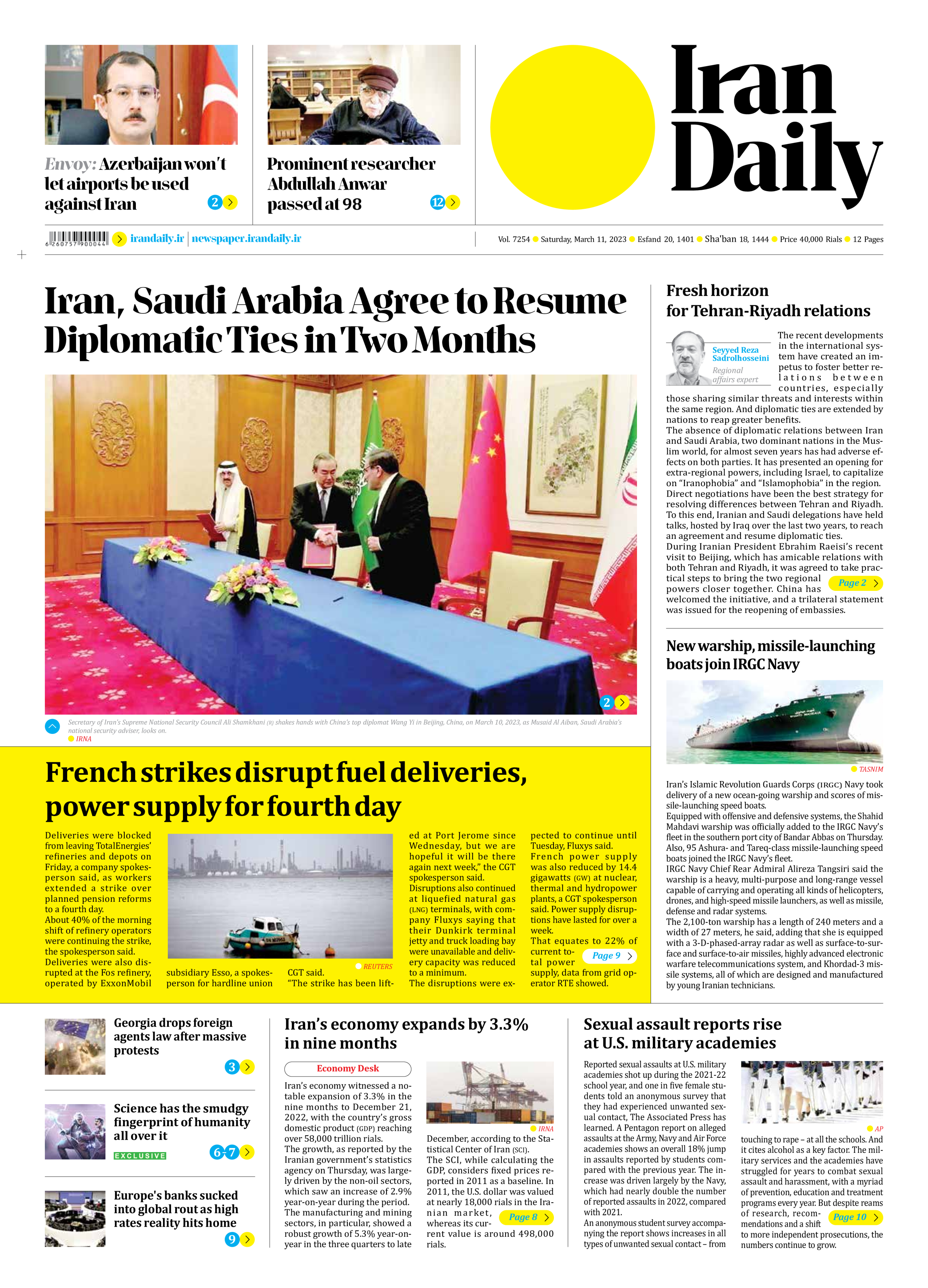
Iran, Saudi Arabia Agree to Resume Diplomatic Ties in Two Months
Iran and Saudi Arabia reached an agreement in the Chinese capital of Beijing to restore their diplomatic relations and reopen embassies and missions, seven years after their ties were broken off over several issues.
The agreement was struck on Friday after several days of intensive negotiations between Secretary of Iran’s Supreme National Security Council (SNSC) Ali Shamkhani and his Saudi counterpart in Beijing. It was officially announced in a joint statement by Iran, Saudi Arabia and China, Press TV reported.
The statement was inked by Shamkhani, Musaid Al Aiban, Saudi Arabia’s national security adviser, and Wang Yi, the director of the Office of the Central Foreign Affairs Commission of the Chinese Communist Party.
Following talks between Iranian President Ebrahim Raeisi and his Chinese counterpart Xi Jinping in Beijing in February, Shamkhani has held intensive talks with his Saudi counterpart in Beijing since Monday to find a final solution to the issues between Tehran and Riyadh.
“As a result of the talks, the Islamic Republic of Iran and the Kingdom of Saudi Arabia agreed to resume diplomatic relations and reopen embassies and [diplomatic] missions within two months,” the joint statement said. It added that Iranian and Saudi foreign ministers, Hossein Amir-Abdollahian and Prince Faisal bin Farhan Al Saud, will meet to “implement this decision and make the necessary arrangements for the exchange of ambassadors”.
According to the statement, Iran and Saudi Arabia highlighted the need to respect each other’s national sovereignty and refrain from interfering in one another’s internal affairs.
They agreed to implement a security cooperation agreement signed in April 2001 and another accord reached in May 1998 to boost economic, commercial, investment, technical, scientific, cultural, sports and youth affairs cooperation, it said.
Iran, Saudi Arabia and China expressed their firm determination to make their utmost efforts to promote regional and international peace and security, it emphasized.
The statement said delegations from Iran and Saudi Arabia, led by Shamkhani and Aiban, held several meetings over the past five days following the Chinese president’s support for the expansion of ties between Tehran and Riyadh based on the principle of good neighborliness and his efforts to host meetings between top Iranian and Saudi officials.
The talks between Shamkhani and Aiban were also held as a result of the keenness of Tehran and Riyadh to resolve differences through dialogue and diplomacy based on fraternal ties and both sides’ adherence to the principles of the United Nations Charter and the Organization of Islamic Cooperation (OIC) Charter and international rules and principles, it added.
Iran and Saudi Arabia also thanked efforts by Iraq and Oman to host the talks between the two sides in 2021 and 2022, the statement noted.
Speaking after signing the agreement, Shamkhani said the negotiations between the two countries were “frank, transparent, and comprehensive”.
“Clearing up the misunderstandings and looking to the future in Tehran-Riyadh relations will definitely lead to the development of regional stability and security and the increase of cooperation between the countries of the Persian Gulf and the Islamic world to manage the existing challenges,” he said.
Shamkhani on Friday held a phone call with Iraqi Prime Minister Mohammed Shia al-Sudani and thanked Baghdad for hosting five rounds of fence-mending talks between Tehran and Riyadh since April 2021, ISNA reported. He made the phone call prior to announcing the Tehran-Riyadh agreement, and described Baghdad’s efforts toward the rapprochement as very valuable.
FM tweet
In a post on his Twitter account on Friday, Iranian Foreign Minister Hossein Amir-Abdollahian said the reconciliation between Tehran and Riyadh is going to endow the regional and Muslim nations with enormous capacities, according to Tasnim News Agency. He added, “The return to normal of relations between Iran and Saudi Arabia will provide great capacities for the two countries, the region, and the Islamic world.”
Amir-Abdollahian also underlined that the administration of Iranian President Ebrahim Raeisi focuses on good neighborliness as a key point in its foreign policy and sticks to the right path vigorously.
The Iranian Foreign Ministry is actively arranging to take further regional steps, he noted. Saudi Arabia severed diplomatic relations with Iran in January 2016 after Iranian protesters, enraged by the execution of prominent Shia cleric Sheikh Nimr Baqir al-Nimr by the Saudi government, stormed its embassy in Tehran.







